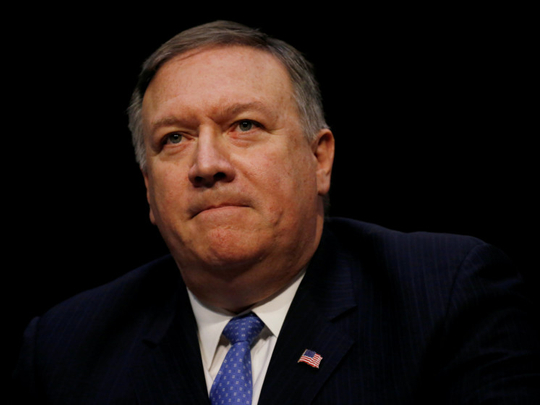
Let’s be clear about the positive attributes of Mike Pompeo that will hold him in good stead if he’s confirmed to replace Rex Tillerson as America’s Secretary of State. Most important, he gets along with President Donald Trump and has become a favourite visitor at the White House.
Pompeo has been giving Trump the daily intelligence briefing, so Pompeo at least knows what Trump believes, what facts he will never accept no matter what and which arguments can move him in one direction or another. Pompeo is also, unlike Tillerson, not afraid of the press. In that respect, his time in Congress was good training. In addition, from all accounts he was a competent manager at the CIA and well-liked.
With the United States State Department in shambles after a failed reorganisation attempt, Pompeo, one could argue, has nowhere to go but up. Moreover, Pompeo clearly knows the role Russia is playing internationally to hobble western democracies and has reiterated the conclusion of the intelligence community that Russia tampered with our election. The challenge will be in not running afoul of the president’s weirdly sympathetic stance towards Russian President Vladimir Putin.
Moreover Tillerson’s failed tenure provides Pompeo with some important lessons.
First, Pompeo should not attempt to run the entire State Department from the offices of a few insulated staffers. The building has an enormous amount of expertise and country/regional knowledge. He would be foolish to disregard it. Tillerson’s cabal of staffers needs to leave swiftly, making way for Pompeo. While Pompeo surely has CIA staffers he would like to bring over, he’ll earn the immediate appreciation and respect of his new department by staffing from within State.
Second, the failure to staff the State Department fully — leaving open critical ambassadorships (e.g., to South Korea), undersecretary slots (e.g., for political affairs, the No 4 position in the department) and assistant secretary posts (e.g. for democracy, human rights and labour) — must be rectified promptly. Hopefully Pompeo will have enough sway with the president to enlarge the field of potential candidates to those who might at some point have uttered a critical word about Trump. If Pompeo’s picks are rejected by White House staffers, that will be a sign he is in for a rocky tenure.
A few more things: Pompeo shouldn’t stiff-arm Congress as Tillerson did far too often. As a man of the House, he understands the role of oversight. Showing respect to members of oversight committees and consulting regularly with them will give him support when things go awry, as they inevitably will.
Pompeo needs to set an entirely different tone on human rights. Tillerson was at best uninterested in and at worst dismissive of a key part of the diplomatic toolkit. The ability to name and shame human rights abusers is a meaningful soft-power weapon against corrupt, repressive regimes. His message that the United States’ closest relationships are with democratic states that share our values should be crystal clear whether dealing with friends or frenemies. Redirecting foreign policy, at least rhetorically, to reflect American values will help Pompeo establish credibility with allies, earn the praise of the diplomatic community and send a signal to autocrats around the world that there is a price to be paid for internal repression and kleptocracy.
He needs to embrace the role of public diplomacy. International advocacy on behalf of the US, regular interaction with the press and, as best as he is able, public education as to the purposes and value of foreign policy are critical aspects of his job that can build support for him personally as well as the administration.
In sum, Pompeo at least has the advantage of a close relationship with Trump and the example of Tillerson’s missteps. Even with all that, he’ll have his work cut out for him. A normal foreign policy is impossible with an erratic president. Pompeo’s job is to make the Trump foreign policy the least awful it can be.
— Washington Post
Jennifer Rubin is a columnist offering opinion from a conservative perspective.











